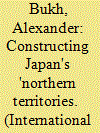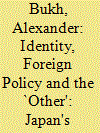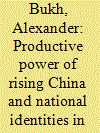|
|
|
Sort Order |
|
|
|
Items / Page
|
|
|
|
|
|
|
| Srl | Item |
| 1 |
ID:
115017


|
|
|
|
|
| Publication |
2012.
|
| Summary/Abstract |
This article seeks to contribute both to the scholarly debate on Japan's territorial dispute with USSR/Russia and to the broader body of academic literature devoted to the ideational factor in foreign policy. By focusing on the formative years of the dispute and examining the variety of symbolic meanings attached to the Soviet-occupied islands by the domestic actors, this article examines the process of the emergence of the idea of the 'Northern Territories' as a national mission. It argues that the formation and institutionalization of the idea of the 'Northern Territories' in its present form can be traced to a complex web of power relations among the domestic actors, none of which perceived the return of the territory as its ultimate goal.
|
|
|
|
|
|
|
|
|
|
|
|
|
|
|
|
| 2 |
ID:
088560


|
|
|
|
|
| Publication |
2009.
|
| Summary/Abstract |
This article examines contemporary Japan's identity construction through the self/other lens, focusing on USSR/Russia as Japan's `other'. It identifies two main constitutive dimensions, political and socio-cultural, along which Japan's identity vis-a-vis the Soviet Union was constructed during the Cold War years. The origins and the nature of these constructs are examined in the first part of this case study. Unlike the existent Japan-related constructivist scholarship, this article argues that postwar Japan's identity had both domestic and international sources and that certain dimensions of the contemporary identity discourse can be traced to the prewar years. It also argues that the political and the socio-cultural identities, while overlapping in certain parts, led to different constructions of the Japanese `self'. The operation of these constructions in Japan's relations with post-communist Russia is examined in the second part of this article, with special attention paid to the territorial dispute which continues to haunt bilateral relations
|
|
|
|
|
|
|
|
|
|
|
|
|
|
|
|
| 3 |
ID:
090270


|
|
|
|
|
| Publication |
2009.
|
| Summary/Abstract |
This article examines contemporary Japan's identity construction through the self/other lens, focusing on USSR/Russia as Japan's `other'. It identifies two main constitutive dimensions, political and socio-cultural, along which Japan's identity vis-a-vis the Soviet Union was constructed during the Cold War years. The origins and the nature of these constructs are examined in the first part of this case study. Unlike the existent Japan-related constructivist scholarship, this article argues that postwar Japan's identity had both domestic and international sources and that certain dimensions of the contemporary identity discourse can be traced to the prewar years. It also argues that the political and the socio-cultural identities, while overlapping in certain parts, led to different constructions of the Japanese `self'. The operation of these constructions in Japan's relations with post-communist Russia is examined in the second part of this article, with special attention paid to the territorial dispute which continues to haunt bilateral relations.
|
|
|
|
|
|
|
|
|
|
|
|
|
|
|
|
| 4 |
ID:
094196


|
|
|
|
|
| Publication |
London, Routledge, 2010.
|
| Description |
xii, 178p.
|
| Series |
Sheffield centre for Japanese studies/Routledge series
|
| Standard Number |
9780415450553
|
|
|
|
|
|
|
|
|
|
|
|
Copies: C:1/I:0,R:0,Q:0
Circulation
| Accession# | Call# | Current Location | Status | Policy | Location |
| 054819 | 327.52047/BUK 054819 | Main | On Shelf | General | |
|
|
|
|
| 5 |
ID:
185988


|
|
|
|
|
| Summary/Abstract |
Drawing on the insights of the constructivist school approach, this article joins the debate on the effects of rising China in Asia. The existing scholarship devoted to no-material aspects of China’s rise focused either on China’s ‘soft power’ initiatives or their reception by certain audiences. In this article, rising China and its governance model, are construed as a form of productive power, one that is expected to bring about not only shifts in material relations and perceptions but also transformations in the national identities of countries in the region. This article focuses on South Korea and Thailand, two countries with fundamentally different political systems but a similar pattern of recent interactions with China. It analyzes the policymaking elites’ discourse and public attitudes and explores the productive effects of China’s rise on national identities in the two countries. This article argues that the impact of China’s rise on elites’ discourse has been largely negligible with narratives on kinship and historical ties being used by the elites mostly for instrumental reasons. At the same time, this article suggests that the recent shifts in public attitudes towards greater acceptance of authoritarian values observed in South Korea and Thailand, may be indicative of the productive effect of rising China on national identities in both countries.
|
|
|
|
|
|
|
|
|
|
|
|
|
|
|
|
| 6 |
ID:
133969


|
|
|
|
|
| Publication |
2014.
|
| Summary/Abstract |
In this article I join the debate on Japan's soft power and cultural diplomacy. Most of the current scholarship focuses on Japan's agency and implies that through a skillfully crafted policy that utilizes its cultural resources, Japan can enhance its soft power. I question the utility of this agent-based approach. I suggest that cultural diplomacy is not simply a matter of diplomatic craftsmanship; it reflects discursively constructed national identities that, to a large degree, are shaped by international ideational structures. Applying this framework to modern Japan's cultural diplomacy, I argue that postwar Japan's incorporation into the Western camp, and the subsequent identity transformations, have precluded the emergence of a strategic definition of Japan's culture and hence constrained Japan's cultural diplomacy.
|
|
|
|
|
|
|
|
|
|
|
|
|
|
|
|
| 7 |
ID:
149540


|
|
|
|
|
| Summary/Abstract |
Since the early 2000s, “soft power” has become one of the most popular analytical tools in International Relations scholarship devoted to analyzing the influence of states in the international arena. Although scholars of Russian foreign policy have also embraced the notion of “soft power”, they have mainly limited the scope of their analysis to Western countries and the former Soviet republics. In contrast, this article focuses on Laos, Vietnam and Thailand, countries whose history of relations with Russia are fundamentally different from both the West and Russia’s “near abroad”. By analyzing the images of Russia and its soft power resources in these countries, this article seeks to create a more comprehensive understanding of the ways contemporary Russia is perceived in the world and its potential tools of influence in Southeast Asia. Drawing on the results of a survey conducted among university students, this article examines the ways young educated elites in the three countries perceive Russia. It also explores the degree of correspondence between these images and the self-image of Russia espoused by its political elites. The results of this study suggest that while overall Russia is perceived as a Great Power, and its role in the world is seen as mostly positive, there are also important dissonances between the two images. Based on discernible differences among the three groups of respondents in the ways they perceive Russia, the article also suggests that historical memory plays an important role in shaping these perceptions.
|
|
|
|
|
|
|
|
|
|
|
|
|
|
|
|
| 8 |
ID:
137138


|
|
|
|
|
| Summary/Abstract |
This paper joins the debate on Japan's territorial dispute with South Korea over the Dokdo/Takeshima islets. Informed by the ontological security framework of analysis, this paper seeks to explain the decision to adopt the ‘Takeshima Day’ ordinance by the Shimane Prefectural Assembly and the subsequent ascendance of ‘Takeshima’ to the fore of Japan's identity construction vis-à-vis the Korean ‘other’. In this paper, I distinguish between two processes: one that led to the adoption of the ordinance and another that resulted in the entrenchment of ‘Takeshima’ in Japan's identity construction vis-à-vis the Korean ‘other’. The paper argues that the former process should be understood within the context of Shimane Prefecture's distinct identity construction vis-à-vis Tokyo, while the latter can be attributed to recent changes in Japan–Korea relations unrelated to the territorial dispute per se.
|
|
|
|
|
|
|
|
|
|
|
|
|
|
|
|
|
|
|
|
|